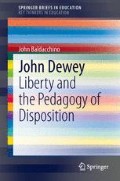Abstract
Education is broadly misconstrued by a fallacy that perceives learning as the production, distribution and consumption of knowledge. A closer look at the outcome of neoliberal models that are now widely adopted across the world on the assumption that they sustain a fair form of meritocracy, reveals that such schools fail to deliver their educational promise and remain intrinsically undemocratic. The discourse and practice of meritocracy could fool no one, even when meritocracy has been uniformly pronounced and supported by politicians from all ideological quarters. Those who closely engage with Dewey’s philosophy will quickly realize that education is like philosophy: it cannot sustain closed and identitarian conclusions. Dewey clearly states that, “action restricted to given and fixed ends may attain great technical efficiency; but efficiency is the only quality to which it can lay claim”. This reflects his radical approach to democracy, which takes place on an ever-expanding horizon of dispositions. This fluid context for a democratic way of living holds an intrinsic value to education and how in the formalized assumptions of learning, schools and societies are bound to each other—for better and for worse, sometimes in concordance with an approach to the transaction of knowing, and sometimes going the opposite way in a transaction that commodifies knowledge. Dewey’s argument distances itself from the extremities of a socialized school on the one hand and that of a schooled society on the other. He argues that, “all that society has accomplished for itself is put, through the agency of the school, at the disposal of its future members.” Does this imply that school and society are each other’s other? Yet the school must make choices that are not simply reflective of society in a mechanistic way. The relationship between the school and society has only one frame of reference in Dewey’s mind, and that is democracy. With democracy as a frame of reference, one gets a clear picture of how society, education and the school, would always need to find a space for interaction and transaction.
Access this chapter
Tax calculation will be finalised at checkout
Purchases are for personal use only
Notes
- 1.
For a concise but clearly developed discussion of the Romantic notion of Bildung and its formative notion of aesthetic education see Beiser (1998). Perhaps the best text that encapsulates this notion is Schiller’s Aesthetic Letters (Schiller 1967).
- 2.
Here I mean amateur in its literal sense of someone who nurtures a love of the inventive, experimental and creative aspects of making. This captures the original meaning of dilettante as someone who takes pleasure in making.
- 3.
Here I have in mind countries with similar patterns of adversarial political blocks, such as Australia, New Zealand and Canada.
- 4.
Elsewhere I have amply critiqued the notion of this assumption of possible reversal, particularly in view of Gramsci’s work and his analysis of Fordism and Taylorism. (See Baldacchino 2002, 2010b)
Author information
Authors and Affiliations
Corresponding author
Rights and permissions
Copyright information
© 2014 The Author(s)
About this chapter
Cite this chapter
Baldacchino, J. (2014). Schooled Quandaries. In: John Dewey. SpringerBriefs in Education(). Springer, Dordrecht. https://doi.org/10.1007/978-94-007-7847-4_7
Download citation
DOI: https://doi.org/10.1007/978-94-007-7847-4_7
Published:
Publisher Name: Springer, Dordrecht
Print ISBN: 978-94-007-7846-7
Online ISBN: 978-94-007-7847-4
eBook Packages: Humanities, Social Sciences and LawEducation (R0)

